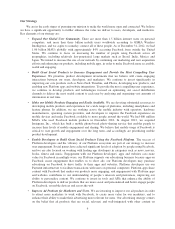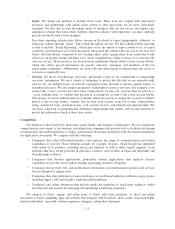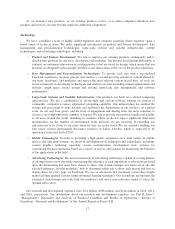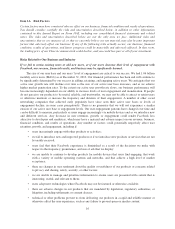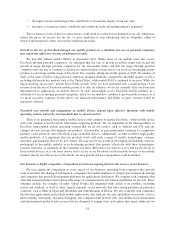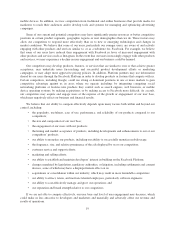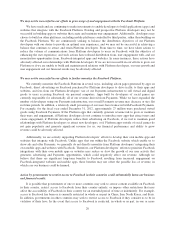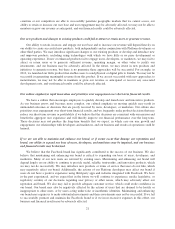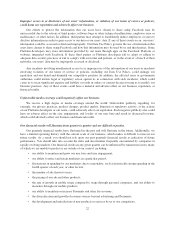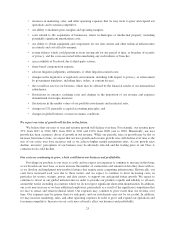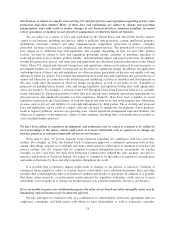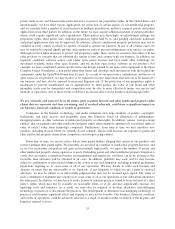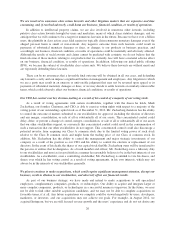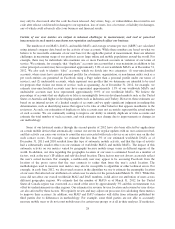Facebook 2012 Annual Report Download - page 22
Download and view the complete annual report
Please find page 22 of the 2012 Facebook annual report below. You can navigate through the pages in the report by either clicking on the pages listed below, or by using the keyword search tool below to find specific information within the annual report.• the impact of new technologies that could block or obscure the display of our ads; and
• the impact of macroeconomic conditions and conditions in the advertising industry in general.
The occurrence of any of these or other factors could result in a reduction in demand for our ads, which may
reduce the prices we receive for our ads, or cause marketers to stop advertising with us altogether, either of
which would negatively affect our revenue and financial results.
Growth in the use of Facebook through our mobile products as a substitute for use on personal computers
may negatively affect our revenue and financial results.
We had 680 million mobile MAUs in December 2012. While most of our mobile users also access
Facebook through personal computers, we anticipate that the rate of growth in mobile usage will exceed the
growth in usage through personal computers for the foreseeable future and that the usage through personal
computers may decline or continue to decline in certain markets, in part due to our focus on developing mobile
products to encourage mobile usage of Facebook. For example, during the fourth quarter of 2012, the number of
daily active users (DAUs) using personal computers declined modestly compared to the third quarter of 2012,
including declines in key markets such as the United States, while mobile DAUs continued to increase. While we
began showing ads in users’ mobile News Feeds in early 2012, we have generated only a small portion of our
revenue from the use of Facebook mobile products to date. In addition, we do not currently offer our Payments
infrastructure to applications on mobile devices. If users increasingly access Facebook mobile products as a
substitute for access through personal computers, and if we are unable to continue to grow mobile revenues, or if
we incur excessive expenses in this effort, our financial performance and ability to grow revenue would be
negatively affected.
Facebook user growth and engagement on mobile devices depend upon effective operation with mobile
operating systems, networks, and standards that we do not control.
There is no guarantee that popular mobile devices will continue to feature Facebook, or that mobile device
users will continue to use Facebook rather than competing products. We are dependent on the interoperability of
Facebook with popular mobile operating systems that we do not control, such as Android and iOS, and any
changes in such systems that degrade our products’ functionality or give preferential treatment to competitive
products could adversely affect Facebook usage on mobile devices. Additionally, in order to deliver high quality
mobile products, it is important that our products work well with a range of mobile technologies, systems,
networks, and standards that we do not control. We may not be successful in developing relationships with key
participants in the mobile industry or in developing products that operate effectively with these technologies,
systems, networks, or standards. In the event that it is more difficult for our users to access and use Facebook on
their mobile devices, or if our users choose not to access or use Facebook on their mobile devices or use mobile
products that do not offer access to Facebook, our user growth and user engagement could be harmed.
Our business is highly competitive. Competition presents an ongoing threat to the success of our business.
We face significant competition in every aspect of our business, including from companies that provide
tools to facilitate the sharing of information, companies that enable marketers to display personalized advertising
and companies that provide development platforms for applications developers. We compete with companies that
offer full-featured products that replicate the range of communications and related capabilities we provide. These
offerings include, for example, Google+, which Google has integrated with certain of its products, including
search and Android, as well as other, largely regional, social networks that have strong positions in particular
countries, such as Mixi in Japan and vKontakte and Odnoklassniki in Russia. We also complete with companies
that develop applications, particularly mobile applications, that replicate discrete capabilities we provide, such as
photo-sharing, messaging, and micro-blogging, and companies that provide web- and mobile-based information
and entertainment products and services that are designed to engage users and capture time spent online and on
18



